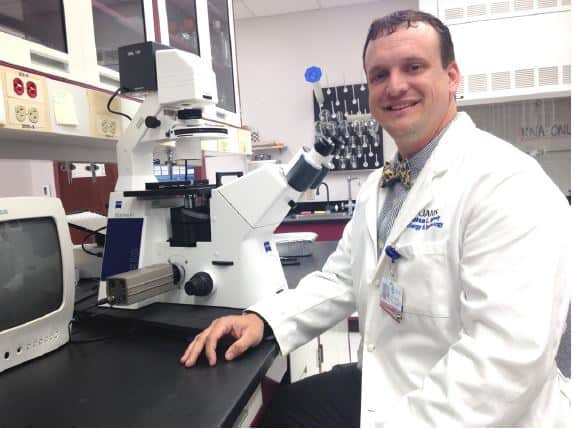View Larger Image

Josh Kennedy, M.D.
Early UAMS Study Results Show 3.5% of Arkansans Infected by Coronavirus
| LITTLE ROCK – Early results from a University of Arkansas for Medical Sciences (UAMS)-led COVID-19 antibody study show that 3.5% of Arkansans have been infected with the novel coronavirus.
UAMS researcher Joshua Kennedy, M.D., revealed the initial findings of the Arkansas Coronavirus Antibodies Seroprevalence Survey during a presentation Oct. 21 with Laura James, M.D., director of the UAMS Translational Research Institute.
The Arkansas Research Alliance (ARA)-sponsored talk focusing on UAMS’ COVID-19 research efforts featured James, an ARA fellow, Kennedy and John Arthur, M.D., Ph.D., also a UAMS COVID-19 researcher. UAMS has eight other studies testing new therapies for COVID-19 either active or in startup.
Kennedy, associate professor in the College of Medicine Department of Pediatrics, along with Craig Forrest, Ph.D., and Karl Boehme, Ph.D., associate professors in the College of Medicine Department of Microbiology and Immunology, have spearheaded an effort to analyze blood samples from Arkansans.
One aspect of the study involved using remnant blood samples from patients who visit UAMS clinics, including three Regional Campus clinics, and have their blood drawn for health reasons other than COVID-19. The samples, which would be discarded otherwise, are being collected and shipped to UAMS from across the state for the antibody test, which was developed in the laboratories of Boehme and Forrest.
Of 1,220 adult blood samples tested so far, 43 were positive, or 3.5%. From this analysis, samples were collected in July and August, 2020. While low overall, Kennedy said, there are noteworthy differences across racial and ethnic groups:
- Hispanic (13 of 73 positive = 17.8%)
- Black/African American (21/501 = 4.19%)
- White/Caucasian (7/550 = 1.27%)
Kennedy said that, “based on the data and statistical analysis to date, Hispanics/Latinx and Blacks/African Americans have a higher percentage of positive COVID-19 antibody tests. This relationship will need to be studied further for other factors that might influence these numbers. We hope to work through some of these issues over the next two waves of the study.”
“These early results show the importance of our efforts to survey statewide,” said James, associate vice chancellor for Clinical and
Translational Research at UAMS. “We will continue to evaluate antibody rates over the next several months to monitor the impact of COVID-19 in Arkansas.”
Seroprevalence is the proportion of people in a population whose blood serum tests positive for a particular disease. Unlike diagnostic tests for COVID-19 the seroprevalence antibody testing looks back into the immune system’s history. A positive antibody test means the person was exposed to the virus and developed antibodies against the virus.
It will give state leaders a good estimate of how many Arkansans have been infected with the virus since it first came to the state, even if they did not become ill or have symptoms.
Kennedy praised the collaboration of UAMS Regional Campuses, whose family medical centers in Fayetteville, Fort Smith and Pine Bluff are all contributing remnant blood samples. The collaboration was also made possible by the new UAMS Rural Research Network and the Translational Research Institute, whose resources are helping make use of Regional Campuses’ infrastructure to include rural areas of Arkansas in health research.
The study began this summer after UAMS researchers developed high-accuracy antibody testing methods. As part of the research program, UAMS is collecting blood samples from nearly 7,500 Arkansas adults and children. Arkansas Children’s is leading the pediatric component of the study. The UAMS College of Public Health is leading the epidemiology component of the study, using the contact tracing call center to enroll study participants and collect health histories and blood samples from individuals who represent the entire state.
The study is supported by $3.3 million in federal coronavirus aid that was then allocated by the Arkansas Coronavirus Aid, Relief and
Economic Security Act Steering Committee created by Gov. Asa Hutchinson.
The Translational Research Institute is supported by grant TL1 TR003109 through the National Center for Advancing Translational Sciences of the National Institutes of Health (NIH).


